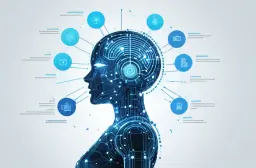Top 10 Healthcare AI Innovation Transforming Medicine

Table of Contents
At the heart of this transformation is Healthcare AI—a field where machine learning models, neural networks, and intelligent systems collaborate with clinicians to make healthcare more precise, efficient, and personalized. But with such rapid change, how do we separate hype from real, transformative innovation?
We’re about to explore the Top 10 Healthcare AI innovations that are not only revolutionizing medicine today but paving the way for a smarter, more responsive healthcare future. Ready to find out which AI breakthroughs are making the biggest impact—and how they might save lives? Let’s dive in.
1. AI for Medical Imaging and Radiology
AI is fundamentally reshaping how we interpret medical images. Traditionally, radiologists spent hours analyzing X-rays, MRIs, and CT scans—but AI-powered medical imaging tools now process these images faster and with incredible accuracy.
Deep learning algorithms can detect early signs of diseases like cancer, pneumonia, and fractures. For instance, Google’s DeepMind developed an AI that outperformed radiologists in breast cancer detection by reducing false positives and negatives.
AI Medical Imaging is being deployed across the U.S., helping hospitals reduce diagnostic errors and shorten patient wait times. As a result, we’re entering an era where radiologists can act more as consultants—interpreting and validating AI findings instead of starting from scratch.
Key Benefits:
- Faster diagnostic turnaround times
- Reduced human error
- Greater image interpretation consistency
2. AI-Powered Virtual Health Assistants
Imagine a friendly AI assistant reminding patients to take medication, monitor symptoms, or even schedule appointments—welcome to the world of AI Health Assistants.
These digital tools combine Healthcare Natural Language Processing with real-time data to offer personalized support. For example, Florence is a virtual nurse chatbot that educates patients and tracks their vitals. Meanwhile, companies like Babylon Health use AI chatbots to triage symptoms before a human consult.
These tools significantly reduce the administrative burden on healthcare providers, enhance patient engagement, and ensure timely interventions for chronic conditions.
Top Use Cases:
- Medication adherence reminders
- Post-surgical care instructions
- 24/7 symptom monitoring
3. Precision Medicine with AI-Based Treatment Plans

Personalized Medicine AI is revolutionizing how treatments are tailored to individual patients. No more one-size-fits-all approaches—instead, AI analyzes genetic profiles, lifestyle data, and clinical history to suggest optimal therapies.
By leveraging Healthcare Data Analytics and predictive algorithms, platforms like IBM Watson Health help oncologists design custom cancer treatment plans. Similarly, Tempus uses AI in Genomics to determine how patients might respond to different drugs.
Benefits include:
- Higher treatment success rates
- Reduced side effects
- Faster time-to-therapy decisions
Example Table: Impact of AI on Precision Oncology
| Approach | Traditional Oncology | AI-Enabled Precision Oncology |
|---|---|---|
| Time to treatment | Weeks | Days |
| Treatment personalization | Limited | High |
| Data considered | Clinical notes | Genomic, lifestyle, EHR |
4. AI in Drug Discovery and Development
Drug discovery is often a slow, expensive process—but AI in Drug Discovery is accelerating breakthroughs by predicting molecule behavior, simulating drug interactions, and even repurposing existing medications.
Startups like Insilico Medicine and Atomwise are using Neural Networks in Healthcare to identify new compounds and forecast their effectiveness in days—not months.
This approach proved vital during the COVID-19 pandemic when AI helped researchers identify potential antiviral compounds in record time.
Advantages:
- Reduced R&D costs by up to 40%
- Faster clinical trial design
- Higher probability of FDA approval
5. AI for Medical Diagnosis and Clinical Decision Support
At the core of AI-Powered Medicine is its ability to assist doctors in making accurate, data-driven decisions. From diagnosing rare genetic disorders to identifying sepsis early, AI Clinical Decision Support systems are invaluable.
Tools like Aidoc analyze medical images for urgent conditions such as strokes, while apps like SkinVision screen for melanoma using smartphone cameras.
By integrating with Electronic Health Records (EHRs), these systems provide real-time alerts, reducing diagnostic delays and improving patient outcomes.
Examples of Clinical AI Applications:
- Early stroke detection
- Diabetic retinopathy analysis
- Sepsis alert systems
6. AI in Surgery and Robotic Assistance
Healthcare Robotics are redefining surgical precision. Robotic systems powered by AI—such as the da Vinci Surgical System—allow surgeons to perform complex procedures with enhanced dexterity and reduced invasiveness.
By integrating AI for Health Data Security, these systems can also analyze prior procedures and suggest adjustments to improve outcomes. Some even learn from surgeons’ techniques, improving over time.
The result? Faster recovery, less pain, and better post-operative outcomes.
Key Innovations:
- Real-time feedback during surgery
- Predictive analytics for surgical planning
- Enhanced motor control and precision
7. Predictive Healthcare AI and Risk Stratification

What if we could identify health risks before symptoms appear? Healthcare Predictive Analytics makes this possible by using AI to forecast patient deterioration, hospital readmission, or even disease outbreaks.
Healthcare systems use platforms like Jvion or Health Catalyst to pinpoint high-risk patients for proactive interventions. These models pull from AI in Public Health data and EHRs to create personalized risk scores.
Such innovations are particularly valuable in Chronic Disease Management, helping reduce ER visits and improving care quality.
Applications Include:
- Predicting heart failure risk
- Monitoring mental health relapse
- Flagging potential opioid misuse
8. AI in Telemedicine and Remote Monitoring
As virtual care gains traction, AI in Telemedicine is becoming essential. From chat-based triage to remote diagnostics, AI enhances accessibility while maintaining quality.
Wearable devices combined with AI for Wearable Health Tech analyze heart rate, sleep patterns, and glucose levels in real time. Platforms like Biofourmis even adjust treatment plans based on patient data trends.
With AI for Patient Care, clinicians can deliver precision care from afar—especially beneficial in rural or underserved areas.
Benefits:
- Continuous, real-time patient monitoring
- Reduced hospital admissions
- Improved chronic disease control
9. Cognitive Computing in Mental Health and Psychology
Mental health care is undergoing a transformation thanks to AI for Mental Health. Tools like Woebot and Wysa provide CBT-based interventions through chat interfaces, while AI models screen for depression or PTSD using voice, text, or facial cues.
By applying Cognitive Computing in Medicine, these tools personalize therapy and ensure early detection—something that’s often missed in traditional settings.
These innovations not only reduce stigma but also improve access and engagement, especially for young adults and remote populations.
Key Features:
- 24/7 support
- Non-judgmental, anonymous interactions
- Personalized cognitive-behavioral therapy
10. AI for Health Data Security and Compliance
With more data comes greater risk. AI for Health Data Security is crucial in protecting sensitive patient information. Advanced algorithms monitor EHR access patterns, detect anomalies, and block cyber threats in real time.
Companies like Darktrace use machine learning to develop security baselines and respond to breaches autonomously. With increasing HIPAA scrutiny, hospitals and insurers are turning to AI in Health Insurance and IT for compliance.
Key Outcomes:
- Real-time threat detection
- Regulatory compliance assurance
- Reduced risk of data breaches
FAQs
How is AI being used in healthcare today?
AI is being applied across medical imaging, diagnosis, drug discovery, surgery, mental health, virtual assistants, and remote monitoring to improve care delivery and efficiency.
What are the main benefits of Healthcare AI?
Benefits include faster diagnostics, personalized treatment plans, reduced operational costs, better patient engagement, and enhanced decision-making.
Is AI replacing doctors?
No. AI supports clinicians by augmenting their capabilities. It reduces routine workload and helps them make more informed decisions, but it doesn’t replace human judgment.
How secure is patient data with AI systems?
Leading AI platforms use encryption, access control, and anomaly detection to ensure health data security. Compliance with HIPAA and other regulations is standard.
Can AI help in managing chronic conditions?
Yes. AI tools can monitor patient data in real-time, predict flare-ups, and suggest interventions—improving outcomes for chronic disease patients.
Conclusion
As we’ve seen, Healthcare AI is more than a buzzword—it’s a catalyst reshaping every layer of the medical ecosystem. From diagnosis and surgery to mental health and patient engagement, these innovations are transforming the way we think about medicine.
The pace of change is only accelerating. As we look ahead, it’s clear that embracing these intelligent systems isn’t just a choice—it’s a necessity for healthcare providers who want to deliver faster, safer, and more personalized care.
Key Takeaways
- Healthcare AI is revolutionizing medical imaging, diagnosis, treatment planning, and patient care.
- Innovations like AI in Drug Discovery, Predictive Healthcare AI, and AI for Health Data Security are enhancing outcomes and reducing costs.
- Adoption of AI-Powered Virtual Health Assistants and AI in Telemedicine is improving accessibility and efficiency in healthcare delivery.
- The integration of AI into clinical workflows empowers medical professionals with data-driven tools for smarter decision-making.
- Security and ethical use of AI in Healthcare remain top priorities for long-term trust and compliance.
Popular Tags
ADS SPACE HERE


